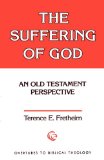All Bible readers are familiar with the story of the flood recorded in the Book of Genesis (or Bereshit as it is called in the Jewish tradition). The story is a sober one. After all, God destroyed the entire world, except for one family and representative pairs of animals. But from the story, particularly the introduction of the story in Genesis 6.5-7, we can learn a lot about God that might surprise us when we compare how this ancient Hebrew narrative depicts God with the “classical” conception of God rooted in Greek philosophy.
For one thing, we learn that God has not determined, or necessitated, all things that occur in history. One school of thought (Calvinism) holds precisely this, namely, that in eternity past, before the creation of the world, God determined all things whatsoever that occur, including all the sin and evil of human beings. He planned all things, the good and the evil, according to his good pleasure for the glorification of himself. But clearly this is not the case according to God’s own revelation, in Genesis 6.5-7, of his thoughts and feelings and ultimately his rationale for flooding the world as he did. God did not plan and will for humanity to fall into such wickedness, otherwise why would he be so grieved over it as Genesis 6.5 states? What sense would that make? And how, according to Genesis 6.6-7, could God truly say he “regretted” creating the first humans if he had planned and willed all their evil deeds in eternity past according to his good pleasure?
Indeed, Genesis 6.5-7 not only reveals that God has not determined all things, it reveals that he does not even foreknow all things as certainties. In this way we might say the future is to a certain extent “open,” not only to us but to God as well. For, again, how could God become grieved over the wickedness of the first humans, as Genesis 6.5 records, if God always knew, from eternity past, that that wickedness was going to certainly occur? And even more significantly, how could God truly say, as Genesis 6.6-7 records, that he “regretted” creating the first humans if he had foreknown from eternity past that they would certainly corrupt themselves as they did? In short, if we take Genesis 6.5-7 seriously, if we listen to what God himself tells us about his thoughts and feelings in this key text of Scripture, then not only has God not planned and determined all things, he does not even foreknow them all as certainties. The reason, of course, is that God created human beings with real freedom—as we all know from experience—and truly free choices cannot be determined, nor can they be foreknown as certain to occur. (I have written more on these topics here and here).
Another thing we learn from the Genesis story of the flood is that evil grieves God deeply. We have seen how this point reveals that God does not determine evil or even foreknow all evil as certain to occur. But the point is significant in its own right as well. God is not an impassible, unfeeling Stoic. On the contrary, he is a God who feels, a God who experiences real emotion. This makes sense. After all, we are created in God’s image, and we are beings of great feeling and emotion as well. But why does God grieve over evil? Well, it seems clear, first of all, that he grieves over it because when human beings do evil deeds and become evil people they fail to achieve their most important potential, namely, to become like God in character. So evil in this way harms the evil-doer. Yet, secondly, evil not only harms the perpetrator, it more obviously harms others affected by the evil, whether directly or indirectly. And this harm inflicted on others through evil also grieves God. Indeed, this is the focus of God’s revelation of his own grief in Genesis 6, for the text links the wickedness of humanity with violence (Genesis 6.11). But the larger point is that evil results in harm not only to evil-doers themselves as well as their victims, it also results in harm to God. It results in God himself being grieved—deeply grieved.
This brings us to a fourth thing we learn about God from the Genesis flood story, namely, that God suffers for and because of human beings. Prior to creation, God did not suffer. God only suffers because he risked his own perfect happiness for the sake of creating other creatures with freedom to become like God in character. What greater gift could God have given to a creature than this opportunity to become like God, the greatest being in the universe and the greatest value in the universe? There could be no greater privilege and so no greater gift. But this gift brought with it the risk of human beings failing to become what God created them to become, and that meant the risk that God would suffer, suffer the grief that this failure of human beings would bring to him. This grief—this suffering—God endured on account of the first humanity that failed, and this suffering he endures now on account of the humanity after the flood that too has failed. Indeed, according to Genesis 8.21, God promised he would not destroy the earth again with a flood even though the new humanity would continue to fill his heart with grief through their evil and violence. Thus God determined, then after the flood, that he would continue to suffer with our race, to endure with us, in other words, for our sake. Second Peter reflecting upon the flood makes this very point. God delays the final judgment of this earth because “he is patient . . . not wishing for any to perish but for all to come to repentance” (2 Peter 3.9-10).
There are certainly more things we can learn about God from the Genesis flood story, but these four are especially significant because they challenge so directly, even contradict, the “classical” conception of God codified in the creeds of Catholic and Protestant Christendom alike. If we take the story of the flood seriously, then what does that say about the classical conception of a God who foreknows all things as certain—and even ordains or determines all things, on the more extreme classical conception? And what does that say about the classical conception of a God who is impassible, unable to suffer or be disturbed from his eternal bliss? If we take the story of the flood seriously, it can only mean that the classical conception of God is a conception that the Genesis story knows nothing about.
Recommended reading:

![]()
The Suffering of God: An Old Testament Perspective
Available on Amazon in Kindle here![]()
Available on Amazon in paperback here![]()

![]()
The God Who Risks
Available on Amazon in Kindle here![]()
Available on Amazon in paperback here![]()
